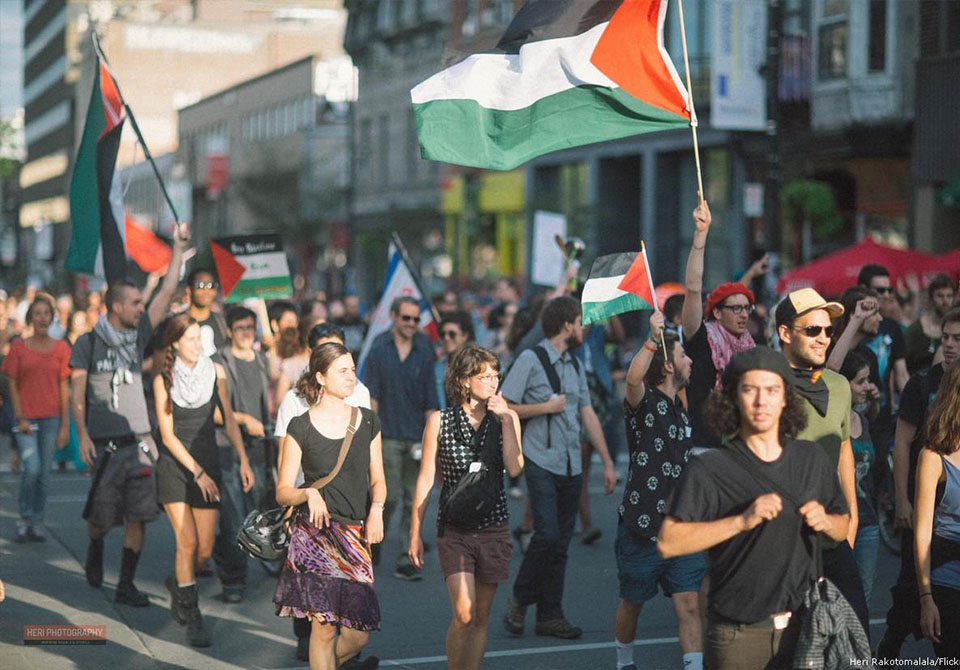Repression of the BDS movement is a sure sign of its success

Despite powerful and globally coordinated Israeli attacks against the boycott, divestment and sanctions movement, BDS is not simply surviving; it is thriving. That is the conclusion of a new report from the Transnational Institute written by Bina Ahmad, Phyllis Bennis and Ben White
Shrinking Space and the BDS Movement is an accomplished work. This important document gives a highly insightful overview of many of the ways in which Israel and its agents and propagandists around the world are waging a war against the Palestine solidarity movement.
The BDS movement was founded in 2005 by Palestinian trade unions and other civil society groups around three demands: the end of Israeli occupation, full equal rights and full right of return for Palestinian refugees.
As the report notes, “Israeli officials were initially slow to respond” to BDS and tended at first to ignore or mock the movement. However, as activists around the world racked up more and more BDS successes, it became impossible to ignore.
In 2014 and 2015, Israel’s then opposition leader Isaac Herzog and President Reuven Rivlin, respectively, both admitted that BDS was a “strategic threat” to the continuation of Israel’s war crimes and apartheid. In 2016, Israel’s openly racist “justice” minister, Ayelet Shaked, bizarrely claimed at a conference in New York that BDS is “a new extension of terrorism.” As the Transnational Institute report notes, such preposterous language is usually reserved for Palestinian resistance fighters or for Iran.
Israel knows full well that when the reality of its racist anti-Palestinian regime is debated openly, it will face an inevitable loss of support. Hence, it is increasingly resorting to attacks, sabotage, dirty tricks and black propaganda to counter the truth.
The covert part of this campaign is led by the so called “Ministry of Strategic Affairs”, a mostly clandestine organisation run by Israeli spies which is engaged in “black-ops” against the Palestine solidarity movement all over the world. Increasingly, Israel has also stepped up its efforts to have BDS outlawed by its friends and allies in mainly Western capitals. The report details how this has achieved mixed results: “Israel, despairing of ever winning ‘the battle for public support’ in many countries, ‘has instead increasingly focused on measures limiting BDS legally.’ In November 2016, Israel’s envoy to the UN, Danny Danon, said: ‘We’re advancing legislation in many countries… so that it will simply be illegal to boycott Israel.’”

As well as in Israel itself, anti-BDS measures have been sought in Britain, France, the Netherlands and other European countries. These have had a chilling effect, but as the report details, they have usually not resulted in the “simply illegal” status that Israel would like to see happen. And, as the report puts it, “BDS is facing an escalating set of attacks precisely because it is winning.”
The BDS movement has, in fact, stacked up some seriously impressive results. The reason that there have been so many attacks on the movement is that it has been “playing a major role in engaging student, faith-based, community and other activists in a global-but-local engagement that challenges Israeli violations of human rights and international law with a set of non-violent pressure tactics that are showing real results.”
Repression has been escalating “precisely because Israel’s supporters realise they are losing public support particularly from young people. That also explains why the attacks are so much tougher, indeed often vicious, against potentially vulnerable student activists.”
In the US and France especially, students have faced very real consequences, such as Palestine societies being effectively shut down, or legal sanctions. Even there, though, “So far, while the space [BDS works in] remains contested, it is not immediately shrinking.”
Global Israeli repression of the BDS movement can by definition only have limited success because it “is influential in ways that only a decentralised, grassroots campaign – in contrast to government propaganda initiatives – can be.”
A key strength of this report is how it situates the Palestinian movement to boycott Israel in the global context; it also does this with the repression it faces: “The historical political and social movements which the BDS movement lifts up as inspiration and precedent also faced repression.”
When there were popular challenges to the apartheid regime in South Africa or the Jim Crow south in the USA, for example, “the response from those in power was swift and harsh. Each of these movements was branded as divisive, violent, criminal, facing official government sanction and criminalisation.”
In other words, resisting such repression is part of the very nature of political struggle. In a further encouraging passage for BDS activists, the report concludes: “Each of those movements continued to resist – and each of those movements ultimately won.”
BDS is winning.
Source: Middle East Monitor

WRITE YOUR COMMENT